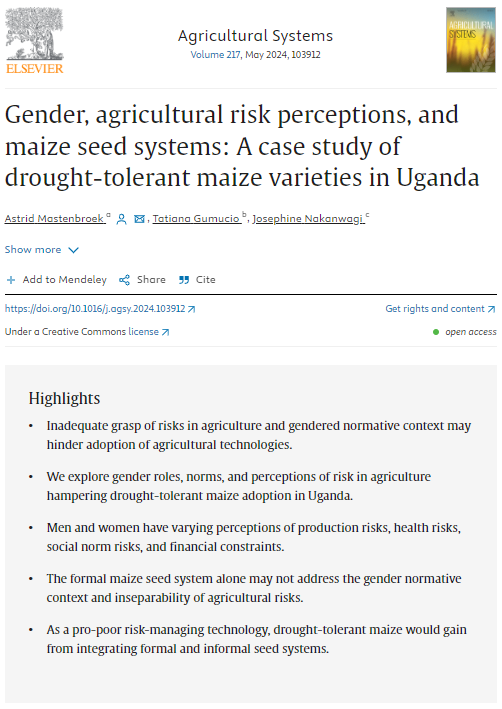Gender, agricultural risk perceptions, and maize seed systems: A case study of drought-tolerant maize varieties in Uganda

Drought-tolerant maize (DTM) varieties and other agricultural technologies can play an important role in maintaining crop production and livelihoods, yet their uptake remains low. Most research on risks in agriculture only considers climate risks as a barrier to adopting agricultural technologies. Farming communities face other agricultural risks related to health, finances, markets, and institutions. These risk perceptions may be different for male and female farmers.
The authors explore the agricultural risk perceptions of male and female smallholder farmers, assessing gender roles and norms and their influence on risk perceptions. Subsequently, they discuss the implications of these perceptions and gender roles and norms on the uptake of drought-tolerant maize varieties in Uganda. They conducted a qualitative study with men’s and women’s focus groups in twelve villages in three districts in Uganda. They used participatory rural appraisal tools with each group to structure the discussions.
Production risks, health risks, social norms, and financial constraints may play an important role in smallholder agricultural decision-making. These risks are inseparable and different for men’s and women’s groups. Women tend to prioritize climate and crop management risks, while men place more weight on financial constraints. The perceived impact of health risks, risks related to social norms, and market risks vary across men and women in different districts. Dokolo reflects more traditional gender roles, while Iganga and Masindi note more contested gendered power over maize cultivation. The risk and concern ranking in Dokolo shows more similarity between men and women compared to Iganga and Masindi. Women tend to have less access to DTM varieties in the formal seed system, while they tend to have fewer resources to mitigate health and crop production risks. To reach and benefit more women with DTM varieties, they draw attention to access to information, bringing seed closer (potentially subsidized), gender transformative interventions, and investment in open-pollinated varieties disseminated through the informal seed system.
Their research emphasizes the importance of considering multiple risks in agriculture when promoting resilient farming systems rather than focusing solely on climate risk. Authors also show the importance of applying a gender lens to these risks and the uptake of DTM varieties. Serving as an inclusive and pro-poor risk management technology, DTM would benefit from ensuring that the technology becomes available to male and female farmers in multiple seed systems, including formal seed systems (primarily hybrids) and informal seed systems (primarily open-pollinated varieties).
https://doi.org/10.1016/j.agsy.2024.103912